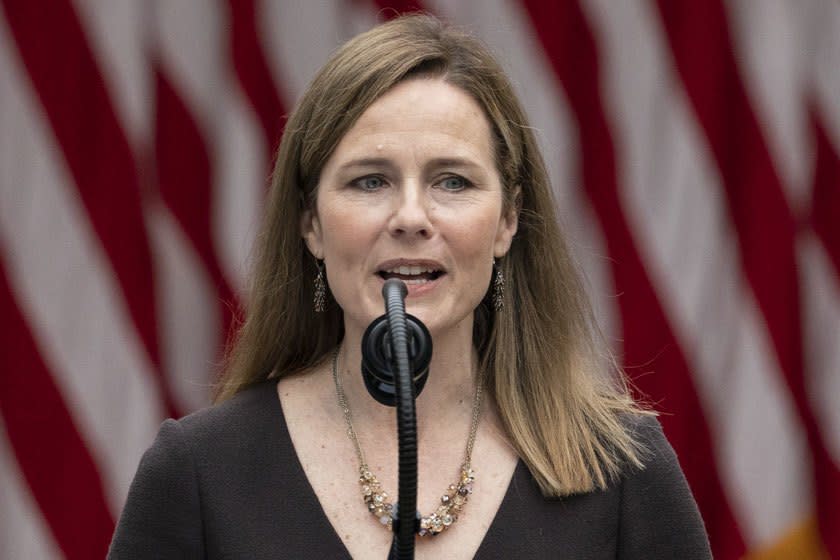Opinion: COVID concerns aside, the Senate should slow down the Barrett confirmation train

Senate Democrats are seizing on President Trump’s infection with COVID-19 to urge a delay in confirmation hearings for Supreme Court nominee Amy Coney Barrett. It’s a prudent suggestion, even if the Democrats have ulterior motives.
In a statement released on Friday, Senate Minority Leader Chuck Schumer and Sen. Dianne Feinstein, the top Democrat on the Judiciary Committee, said that it would be premature for the committee chairman, Sen. Lindsey Graham (R-S.C.), to commit to a hearing schedule for Barrett.
They cited a lack of knowledge about the “full extent of potential exposure stemming from the president’s infection" and said hearings shouldn't be scheduled "before the White House puts in place a contact tracing plan to prevent further spread of the disease.” The statement also mentioned that Sen. Mike Lee (R-Utah) had been infected and said that fact “makes even more clear that health and safety must guide the schedule for all Senate activities, including hearings.”
Schumer and Feinstein also referred to “bipartisan agreement that a virtual confirmation hearing for a lifetime appointment to the federal bench is not an acceptable substitute” — though a Feinstein aide indicated that this was a reference to comments by various senators rather than any formal agreement.
Sen. Chris Murphy (D-Conn.) chimed in, declaring, “We can’t move forward on Amy Coney Barrett or anything else until we know whether there was some super-spreader event at the White House or at that [presidential] debate.”
Murphy also said that despite reports that Barrett had recovered from COVID-19 earlier in the year, it’s not certain how long antibodies last and that she should quarantine. (The White House has not commented on whether Barrett had a previous diagnosis. A spokesman said that the judge had a negative coronavirus test Friday morning.)
So far Graham and Senate Majority Leader Mitch McConnell (R-Ky.) don’t seem fazed by the suggestion that they should slow down the confirmation train. On Friday Graham tweeted: “Talked to Senator Lee earlier today and wished him a speedy recovery. Look forward to welcoming him back to [the Judiciary Committee] to proceed with the nomination of Judge Amy Coney Barrett on Oct. 12.”
I'm not in a position to pronounce on whether sufficient precautions could be taken to make it safe for the Barrett hearing to begin on Oct. 12. Lee could participate remotely, and presumably Barrett could as well, although Sen. John Thune (R-S.D.) said: "My guess is you would want to have her there in person."
But the idea that the hearings must start on that date is ridiculous entirely apart from a COVID scare.
The Republicans are railroading the hearings in an attempt to install Barrett on the Supreme Court ASAP, in a hypocritical contradiction of McConnell’s suggestion in 2016 that Supreme Court vacancies in election years shouldn’t be filled so the voters could have their say. Hastily confirming Barrett would be objectionable regardless of the state of the president’s health or that of the nominee or members of the committee.
The Democrats likely would try to delay action on Barrett’s nomination even in the absence of Trump’s COVID diagnosis. Their objection on health grounds may be an argument of convenience, but their larger point is irrefutable: There is no need to rush this confirmation process.
This story originally appeared in Los Angeles Times.

